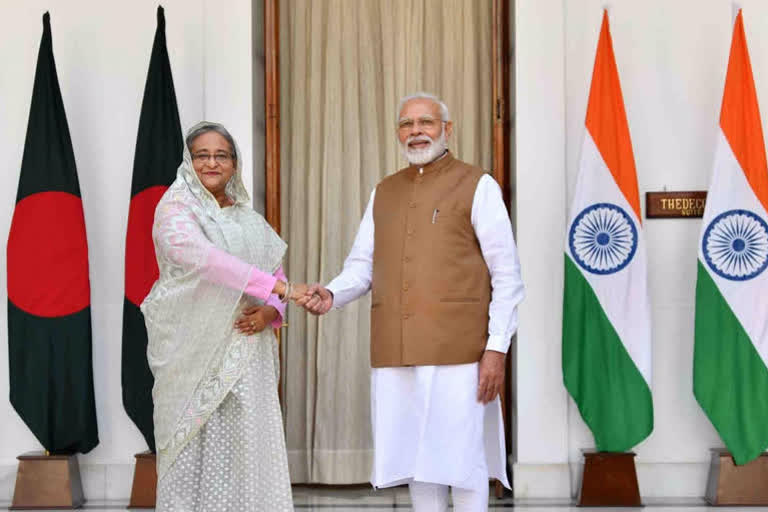New Delhi: Prime Narendra Modi and his counterpart in Bangladesh Sheikh Hasina during a virtual bilateral summit on Thursday signed seven agreements including the inauguration of the Haldibari-Chilahati rail link, the launch of a stamp to commemorate the birth centenary of Bangabandhu Sheikh Mujibur Rahman, the Bangabandhu-Bapu digital exhibition and a Ba-Bangamata wall and few agreements ranging from Hydrocarbons to agriculture. The agreements have paved a path towards development and strengthening of ties between the two nations.
However, Teesta river water has been a tough deal to sign. It has been hanging fire for more than 35 years with no conclusion yet. An agreement was reached between the two countries but could not be inked yet.
In an exclusive interview with ETV Bharat, India’s former high commissioner to Bangladesh, Ambassador Pinak Ranjan Chakravarty said, “Whatever agreements are been signed till now are doable. Agreements related to sovereignty, maritime boundary, land boundary, connectivity, coastal shipping has been signed between the two nations.
But sharing of river waters is not an easy issue; it is a very complex issue and it is tied up with India’s domestic politics as West Bengal does not agree to the sharing agreements that have been drafted. 54 trans-border rivers flow from India into Bangladesh. We have only one agreement – the Ganga Waters agreement which was signed in 1996 for 30 years and that is also going to come up for review soon."
He says that the availability of water overall has been going down for various reasons which include demography and rise in population. While rice cultivation which is very water-intensive on sides, climate change, and hydropower have contributed to unavailability of water especially in the lean season. ”There is a mismatch of availability of water between the lean season and excess season. It is a management issue also. How do you we manage so much water in one season and lack of water in the other? he added.
“So this is a long term process and there is a need to look at it in terms of larger river basin system, involve Nepal and Bhutan where many of these rivers originate. This is a long term problem and cannot be easily sorted out overnight because it is a far too complex issue to come across a table for negotiation. There are other countries involved; water availability is an issue too. It has to perhaps go with things like how one can change the pattern of agriculture that uses less water. These are some of the issues that should be kept in mind,” ambassador Chakravarty explained.
West Bengal Chief Minister Mamata Banerjee opposed the Teesta water-sharing formula citing global warming having its impact on the glaciers that feed the river, and the NDA government decided not to invoke Article 253 of the Constitution to get the bilateral deal done. The Constitution allows the Centre to sign any international or bilateral treaty despite the objection of a state.
Does China matters in the Teesta River?
China is extending about 1 billion dollars to Bangladesh for the Teesta River’s management which has become a matter of concerns. When India and Bangladesh agreed for Teesta river water sharing formula for the yet-to-be-inked deal, China was not a factor. But now there is a Chinese angle to the Teesta river management in Bangladesh and it seems the question of renegotiating of the Teesta river deal has arisen.
